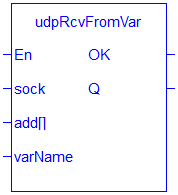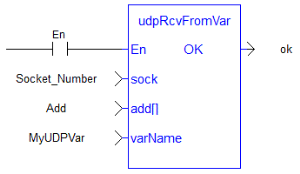![]()
 Function
Function![]() A function calculates a result according to the current value of its inputs. A function has no internal data and is not linked to declared instances. - Receives the contents of a variable from another controller through UDP
A function calculates a result according to the current value of its inputs. A function has no internal data and is not linked to declared instances. - Receives the contents of a variable from another controller through UDP![]() "User Datagram Protocol".
"User Datagram Protocol".
Inputs
|
Input |
Data Type |
Range |
Unit |
Default |
Description |
|---|---|---|---|---|---|
|
En |
BOOL |
0, 1 |
N/A |
No default |
Execute the function. |
|
sock |
DINT |
0, 65535 |
N/A |
No default |
Socket number, return value from udpCreate. |
|
add[ ] |
USINT |
0, 32 |
N/A |
No default |
Array which contains information about the server. This includes the sender's IP address. |
|
varName |
STRING |
|
N/A |
No default |
The name of a PxMM variable (or array or structure) that stores data from the sender. The variable should be the same type as what is being sent. See udpSendToVar for more information. |
Outputs
|
Output |
Data Type |
Range |
Unit |
Description |
|---|---|---|---|---|
|
OK |
BOOL |
|
N/A |
Returns TRUE when the function successfully executes. See Pipe Network - General Rules for more information. |
|
Q |
DINT |
|
N/A |
Number of bytes received. |
Remarks
- Receives the contents a variable sent from another controller and saves it to a local variable.
- This allows for the exchange of data across controllers.

-
-
Limitations
- Function block instance variable types are not supported.
- These types of variables cannot be sent or received:
- Variables defined with a UDFB
 "User Defined Function Block"
UDFB can be used as a sub-function block in another program of the application. It is described using FBD, LD, ST or IL language. Input / output parameters of a UDFB (as well as private variables) are declared in the variable editor as local variables of the UDFB.
"User Defined Function Block"
UDFB can be used as a sub-function block in another program of the application. It is described using FBD, LD, ST or IL language. Input / output parameters of a UDFB (as well as private variables) are declared in the variable editor as local variables of the UDFB. - The Input and Output variables defined for a sub-program.
- Variables defined with a UDFB
- udpSendToVar and udpRcvFromVar do not automatically swap bytes for big vs. little endian systems.
- Send / receive functionality is:
PCMM / AKD PDMM
PCMM2G
Simulator
PCMM / AKD PDMM



PCMM2G



Simulator



Compatibility is based on the endianness of the controller's information.
PCMM and AKD PDMM are big-endian.
PCMM2G and Simulator are little-endian. - 3rd party stand-alone programs on x86 platforms are responsible for endian conversions for UDP telegrams from a AKD PDMM / PCMM.
FBD Language Example
FFLD Language Example
IL Language Example
Not available.
ST Language Example
udpRcvFromVar( Socket_Number, Add, MyUDPVar )








